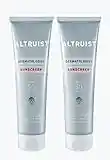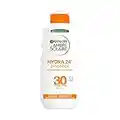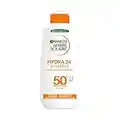Introduction
Hello, fellow Brits! Living in our beloved United Kingdom, with our unpredictable weather, we understand the importance of a good sunscreen in our skincare routine. Whether it's a rare sunny day in London or a cloudy afternoon in Scotland, sun protection should not be overlooked. But with an overwhelming array of options, how do you choose the right one? This guide will help you navigate through the choices with the ease of a Sunday stroll in Hyde Park.
Understanding the Basics
Before we begin, let's get our facts straight about sunscreen. It's a product we use to shield our skin from the sun's harmful rays, preventing premature ageing and skin cancer. It primarily protects against two types of UV rays: UVA and UVB. UVA rays, which can penetrate cloud cover and even glass, are responsible for premature ageing. UVB rays, which become particularly potent during our short but intense summer, can cause sunburn and contribute to skin cancer. The Sun Protection Factor, or SPF, measures how well a sunscreen can protect against UVB rays.
Types of Sunscreen
Sunscreen comes in two main types: physical (or mineral) and chemical.
Physical sunscreens contain active mineral ingredients such as zinc oxide or titanium dioxide. These ingredients form a protective layer on your skin and deflect harmful UV rays.
Chemical sunscreens contain organic (carbon-based) compounds like oxybenzone or octisalate, which absorb UV rays, convert them into heat and release the heat from the skin.
Each type has its pros and cons. The choice often boils down to your skin type and personal preference.
How to Choose the Right Sunscreen for Your Skin Type
Oily Skin
If your skin tends to be oily, look for oil-free and non-comedogenic sunscreens that won't clog your pores. Labels like "lightweight," "matte finish," or "oil-control" are your friends.
Dry Skin
Those of us with dry skin, particularly during our nippy winters, should opt for cream-based sunscreens with moisturising ingredients like hyaluronic acid and ceramides. Avoid sunscreens with high alcohol content, as they can exacerbate dryness.
Sensitive Skin
Brits with sensitive skin should lean towards physical sunscreens, as they're less likely to cause irritation. Look for sunscreens labelled as "fragrance-free" and "hypoallergenic."
Darker Skin Tones
While everyone needs protection from UV rays, individuals with darker skin may struggle with the white cast left by some sunscreens, especially physical ones. "Sheer" or "invisible" formulas are your best bet, or consider tinted sunscreens.
Special Considerations
Even under our often cloudy skies, UV rays can still reach your skin. And while water-resistant sunscreens are a great choice for a day at Brighton Beach or a sweaty game of football, remember that they need to be reapplied every 40 to 80 minutes.
Myths and Misconceptions
Higher SPF means I don’t need to reapply as often
Regardless of the SPF number, it's crucial to reapply sunscreen every two hours, or after heavy perspiration or swimming.
FAQs
Q1: Can I just use makeup with SPF instead of sunscreen? No, makeup with SPF doesn’t provide adequate sun protection on its own, based on the amount of makeup people typically apply.
Q2: Should I wear sunscreen at night? There's no need for sunscreen at night. The core purpose of sunscreen is to block UV rays that come from the sun. With no sun, there's no need for sunscreen.
Q3: Can sunscreen replace my moisturizer? Yes, sunscreen can replace moisturizer if the sunscreen contains a sufficient amount of moisturizing ingredients, including ceramides, emollients, and humectants, which help prevent moisture loss that lubricates the skin.



